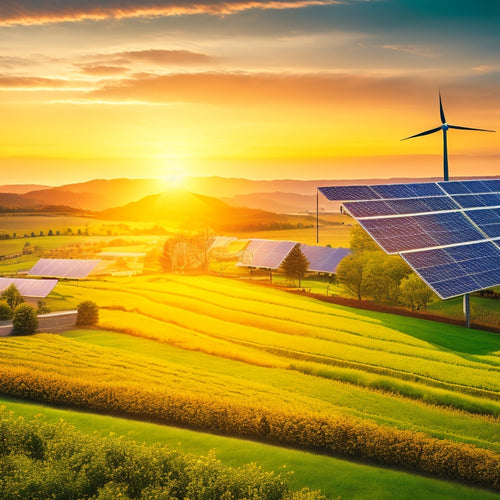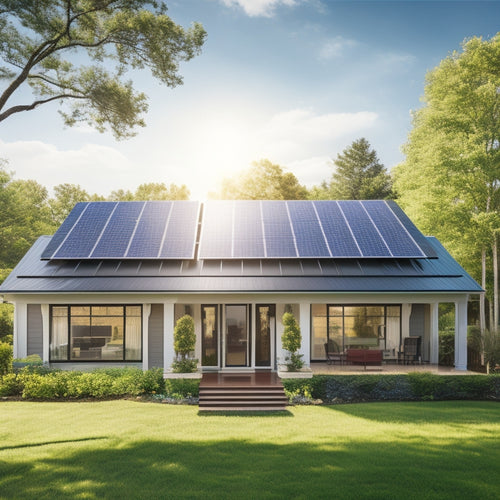
Renewable Energy Solutions to Reduce Your Carbon Footprint
Share
To reduce your carbon footprint, adopting renewable energy solutions is key. Using solar panels or wind turbines can greatly lower your energy costs and enhance your property value. These sustainable energy sources not only cut down on greenhouse gas emissions but also promote cleaner air and better public health. Evaluating your energy consumption helps identify areas for improvement, optimizing efficiency and savings. Various financial incentives are available to ease the initial investment, making renewables more accessible. The benefits accumulate over time, leading to both economic and environmental gains—discover how you can start this change today.
At a Glance
- Investing in solar panels and wind turbines can lead to significant annual savings on utility bills while reducing your carbon footprint.
- Various federal and state incentives, such as tax credits and rebates, make renewable energy investments more affordable.
- Regular energy audits help identify inefficiencies, guiding improvements that can further decrease energy consumption and carbon emissions.
- Renewable energy sources like biomass and geothermal power contribute to ecological sustainability by minimizing land use and habitat destruction.
- Transitioning to renewable energy enhances property value and promotes energy independence, aligning financial savings with environmental responsibility.
Cost-Effective Energy Source
When considering renewable energy, you'll find that the long-term savings potential can considerably reduce your overall energy costs.
Solar panel and battery kits provide homeowners with energy independence, allowing them to store excess energy and lower their reliance on traditional grids.
Many governments offer incentives and rebates that make the initial investment more manageable, further enhancing the financial appeal of these energy sources increased property value.
Long-Term Savings Potential
Investing in renewable energy solutions can greatly reduce your long-term energy costs. By prioritizing energy efficiency in your home or business, you're not only choosing a sustainable path but also making a smart financial decision. Over time, the savings on your utility bills can accumulate considerably, allowing for better financial planning for your future.
Here's a quick breakdown of potential savings:
| Energy Source | Initial Investment | Annual Savings |
|---|---|---|
| Solar Panels | $15,000 | $1,500 |
| Wind Turbines | $30,000 | $3,000 |
| Geothermal Energy | $20,000 | $2,500 |
These figures highlight how renewable energy can provide you with a sense of freedom from rising utility costs. The initial investment might seem substantial, but the long-term savings potential is persuasive. You'll enjoy lower bills while contributing to a sustainable future. Additionally, as technology advances, the costs of these renewable solutions continue to decrease, making them even more accessible. Ultimately, adopting renewable energy not only benefits your wallet but also enables you to lead a more environmentally conscious lifestyle.
Incentives and Rebates Available
Many homeowners and businesses can benefit from a variety of incentives and rebates designed to make renewable energy solutions more affordable. Federal incentives, such as the Investment Tax Credit (ITC), allow you to deduct a substantial percentage of your solar system costs from your federal taxes.
Additionally, many states offer tax rebates and grants, reducing your upfront investment and making renewable energy even more appealing. Utility programs often provide financial assistance and incentives for energy efficiency upgrades, allowing you to save on both installation costs and long-term energy bills.
State grants can further support your shift to renewable sources, often covering a portion of your expenses for solar panels or energy-efficient appliances. Renewable financing options are also available, enabling you to invest in green technologies without a hefty upfront payment.
Finally, energy credits can help offset your energy costs, ensuring that your investment pays off over time. By taking advantage of these incentives, you not only reduce your carbon footprint but also achieve financial freedom.
Embracing renewable energy isn't just an environmentally responsible choice; it's a smart economic decision.
Sustainable Long-Term Energy Savings
When you consider sustainable long-term energy savings, cost-effective alternatives become essential.
By adopting renewable energy sources, you not only reduce your energy bills but also take advantage of various incentives that governments offer to promote green technology. These incentives can greatly lower your initial investment, making the shift to renewable energy both financially viable and environmentally responsible.
Additionally, installing solar panels can lead to increased property value and provide a steady income stream through net metering, ensuring that your investment pays off over time.
Cost-Effective Energy Alternatives
Cost-effective energy alternatives are increasingly becoming the cornerstone of sustainable long-term energy savings. By investing in renewable technologies like solar panels and wind turbines, you can greatly reduce your carbon footprint while saving on energy costs. Energy storage solutions help you maximize the benefits of these systems, ensuring you have access to power even when the sun isn't shining or the wind isn't blowing.
Here's a quick breakdown of some effective options:
| Energy Alternative | Key Benefits |
|---|---|
| Solar Panels | Lower electricity bills, independence from grid |
| Wind Turbines | Sustainable energy source, low operating costs |
| Biomass Energy | employs waste materials, reduces landfill use |
Other options like geothermal systems and hydroelectric power provide reliable alternatives, while electric vehicles powered by renewable energy further enhance savings. Smart meters enable efficient grid integration, allowing you to monitor energy usage effectively. Community solar projects can also enable neighborhoods to collaborate on energy solutions, cultivating a sense of freedom and ownership. By choosing these cost-effective options, you're not only saving money but also taking meaningful steps toward a more sustainable future.
Incentives for Renewable Adoption
Incentives for renewable adoption can greatly enhance your ability to invest in sustainable energy solutions. Various government policies and community programs are designed to reduce the financial burden of shifting to renewable energy. Tax credits, rebates, and grants not only lower upfront costs but also encourage long-term savings on energy bills.
For instance, the federal Investment Tax Credit (ITC) allows homeowners to deduct a significant percentage of the installation costs for solar panels from their federal taxes.
Additionally, many states offer their own incentives, creating a patchwork of opportunities that can make your investment even more appealing. Community programs often provide collective purchasing options, allowing you to join forces with neighbors to secure better rates on renewable installations.
By leveraging these incentives, you're not just making a responsible choice for the environment—you're also optimizing your financial freedom.
As renewable energy becomes more mainstream, these incentives will likely evolve, adapting to market demands and technological advancements. Engaging with local resources can help you steer through these options effectively, ensuring you maximize both savings and sustainability in your energy choices.
Key Benefits Overview
When you consider renewable energy solutions, the key benefits become clear: they greatly reduce environmental impact and offer substantial cost savings.
By shifting to cleaner energy sources, you're not only helping to decrease greenhouse gas emissions but also potentially lowering your energy bills in the long run.
Additionally, embracing solar power systems promotes energy independence, allowing you to take control of your energy needs and manage consumption effectively, which can lead to increased energy autonomy.
Understanding these advantages can guide you in making more sustainable choices for both your finances and the planet.
Environmental Impact Reduction
Renewable energy solutions play an essential role in considerably reducing environmental impacts, offering a range of benefits that extend beyond mere sustainability. By utilizing energy from sources like wind, solar, and hydropower, you markedly lower your carbon footprint.
Traditional energy sources, such as coal and natural gas, emit greenhouse gases that contribute to climate change. In contrast, renewables produce little to no emissions during operation, making them a cleaner alternative.
Moreover, adopting renewable energy promotes ecological sustainability. It supports biodiversity by reducing habitat destruction associated with fossil fuel extraction and production.
For instance, solar panels can be installed on rooftops, minimizing land use and preserving natural spaces. Additionally, many renewable technologies are designed to integrate harmoniously with the environment, such as wind farms that coexist with agricultural land.
The shift to renewable energy also creates opportunities for innovation and job growth in green technologies, enabling communities to take charge of their energy needs.
By choosing renewable options, you're not just making a personal choice; you're actively participating in a broader movement toward a sustainable and healthier planet for future generations.
Welcome these solutions and contribute to a cleaner, more resilient world.
Cost Savings Potential
Considerable cost savings await those who invest in renewable energy solutions, making them an attractive option for both individuals and businesses. By adopting technologies like solar panels or wind turbines, you can drastically reduce your utility bills. Studies show that homes with solar energy systems can save up to 50% on their monthly electricity costs. This translates into thousands of dollars over the lifespan of the system.
Moreover, renewable energy systems often lead to increased energy efficiency. As you generate your own power, you're less reliant on fluctuating energy prices from traditional utility companies. This independence not only protects you from rising costs but also aligns with a desire for self-sufficiency.
Incentives and tax credits further enhance these savings, making the initial investment more palatable. Many states offer rebates for installing renewable energy systems, which can offset installation costs considerably.
Ultimately, investing in renewable energy isn't just about saving money; it's about embracing a lifestyle that prioritizes sustainability and freedom from unpredictable energy markets. As you take control of your energy needs, you'll find that financial benefits and environmental responsibility go hand in hand.
Assess Your Energy Consumption
To effectively shift to renewable energy, you need to track your energy usage consistently.
This includes conducting thorough home audits to identify inefficiencies and improvement opportunities. By identifying high consumption areas in your home or business, you can target strategies that reduce waste and optimize efficiency.
This data-driven approach not only helps you save money but also enhances your overall sustainability efforts, emphasizing the importance of assessing energy needs for a successful shift.
Track Energy Usage
As you begin to assess your energy consumption, understanding how and where you use energy can lead to more informed decisions about your energy efficiency. To achieve this, implementing energy monitoring tools is essential. These tools provide real-time data on your energy usage, allowing you to visualize your consumption patterns.
By utilizing usage analytics, you can identify specific times or devices that contribute greatly to your overall energy footprint. Regularly tracking your energy consumption not only helps you spot trends but also enables you to make proactive choices.
For instance, you might find that certain appliances consume more energy than you realized. With this knowledge, you can decide to replace inefficient devices with energy-efficient models or adjust your usage habits during peak hours.
Moreover, many energy monitoring systems offer features that compare your usage against similar households, providing background to your data. This comparison can inspire you to set realistic energy-saving goals.
Ultimately, by understanding your energy consumption through careful tracking and analysis, you'll take considerable steps towards reducing your carbon footprint while enjoying the freedom of informed decision-making.
Identify High Consumption Areas
Identifying high consumption areas in your home or business is essential for optimizing energy efficiency. You can start by conducting energy audits, which systematically evaluate your energy usage and highlight where you're consuming more than necessary. This process helps you pinpoint specific appliances or practices that contribute greatly to your overall consumption patterns.
Look at your utility bills over the past few months. They can reveal trends and spikes in energy use, guiding you to focus on problematic areas. For instance, heating and cooling systems often account for a large portion of your consumption. Consider whether your insulation is adequate or if your thermostat settings could be adjusted.
Additionally, evaluate your appliances. Older models, especially refrigerators and washers, may use more energy than newer, energy-efficient alternatives. By identifying these high-consumption areas, you gain the freedom to make informed decisions about upgrades or behavioral changes that can greatly lower your energy bills.
Together with renewable energy solutions, understanding your consumption patterns enables you to take actionable steps towards reducing your carbon footprint and enhancing your financial savings.
Lower Environmental Impact
When you consider sustainable energy sources, it's clear they play an essential role in reducing your environmental footprint.
By moving to alternatives like solar, wind, and hydroelectric power, you can markedly decrease greenhouse gas emissions and reliance on fossil fuels.
This change not only benefits the planet but also enhances energy security and promotes a healthier ecosystem.
Sustainable Energy Sources
A growing number of communities are turning to sustainable energy sources to reduce their environmental impact and combat climate change. By leveraging solar technology and wind energy, you can contribute to a cleaner, greener future. Both methods offer significant benefits, but they function best in different conditions.
| Energy Source | Advantages |
|---|---|
| Solar Technology | Low operational costs, scalability |
| Wind Energy | High energy output, land efficiency |
Solar technology employs photovoltaic cells to convert sunlight into electricity, making it versatile for residential and commercial applications. It's particularly effective in sunny regions, allowing you to lower your energy bills while minimizing carbon emissions. On the other hand, wind energy captures kinetic energy from wind currents via turbines. This method can produce large amounts of energy, especially in open areas with consistent winds.
As you consider integrating these sustainable energy sources into your life, you're not just reducing your carbon footprint; you're taking an active role in promoting environmental sustainability. Embracing these innovations can enable you to live freely while protecting the planet for future generations.
Frequently Asked Questions
What Are the Different Types of Renewable Energy Sources Available?
You'll find various renewable energy sources, including solar power, wind energy, geothermal systems, hydropower options, biomass resources, and tidal energy. Each offers unique benefits, helping you utilize nature's power for sustainable living and freedom.
How Can I Get Started With Renewable Energy at Home?
You'll want to immerse yourself, starting with solar panel installation. Research energy efficiency tips to maximize savings. Investigate local incentives, and consider small adjustments to your lifestyle. Every step toward sustainability enables your freedom and reduces bills.
Are There Government Incentives for Using Renewable Energy?
Yes, there're government incentives for using renewable energy. You can access tax credits and energy rebates, which greatly reduce initial costs. Research local programs to maximize your benefits and enhance your freedom in energy choices.
How Does Renewable Energy Affect Property Values?
Renewable energy investments can positively influence property value trends. Homes with solar panels or energy-efficient features often sell for higher prices, reflecting buyer preferences for sustainability and lower utility costs, ultimately enhancing your property's market appeal.
What Maintenance Is Required for Renewable Energy Systems?
Maintaining renewable energy systems isn't a walk in the park! You'll need to check those solar panels for dirt and debris, while wind turbines demand regular inspections and part replacements. It's essential if you want efficiency!
Explore More
By embracing renewable energy solutions, you can substantially reduce your carbon footprint and enjoy long-term savings. As the saying goes, "a stitch in time saves nine," meaning that taking proactive steps now will yield greater benefits in the future. Evaluating your energy consumption allows you to tailor solutions that not only lower your environmental impact but also enhance your overall energy efficiency. Shifting to sustainable energy is a smart investment in both your wallet and the planet.
Related Posts
-

Net Metering in Renewable Energy's Future
Net metering's future is vital for driving renewable energy growth and financial savings. You can reduce your electri...
-

Replacing Old Appliances With Sustainable Alternatives
Replacing old appliances with sustainable alternatives can change your home into an energy-efficient space. Not only ...
-

Home Solar Installation Cost
You're considering installing solar panels on your home, and the upfront cost is likely the biggest hurdle standing i...


